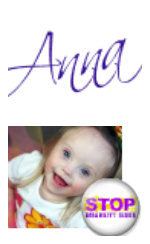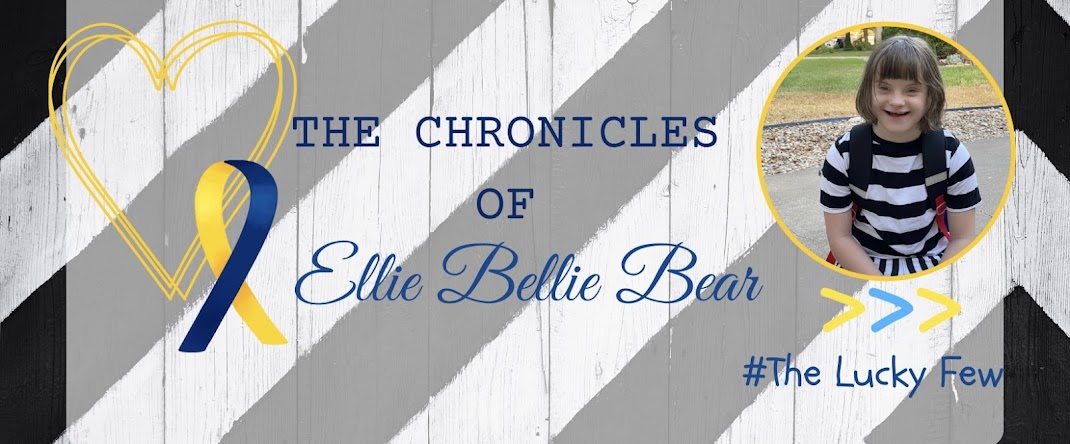Our IEP meeting (it is called ARD in Texas) is only 5 days away so I was presently surprised to receive an email from the School-Based Assessment Team that contained a comprehensive report on Ellie's screening, assessment, and their recommendations. I honestly believed that I would be sitting all lonely in a large conference room facing 30 people (alright, truthfully it will more likely be 6 people at this stage of Pre-K) being completely blindsided by their findings and by their recommendations. Come on, we have all heard horror stories!
I mentioned in my previous post that I believed Ellie's screening and assessment went very well in that the team was able to witness Ellie's strengths and weaknesses. I can now happily report that after reading their tiny font 14 page summary, I was correct. The team truly watched Ellie in all of her hyperactive glory and identified her areas that need assistance and her areas that are strengths. The report is extremely detailed and is divided up into birth & medical history, self help skills, cognitive, communication, social skills, gross motor, fine motor, etc. It includes a summary of reports from Ellie's private therapists (speech, ECI, and ABA) and her developmental pediatrician, parent reports, the team's observations, as well as the results of the standardized testing. It also explains to the school district why she qualifies for special education services. In the state of Texas, most preschool-aged children with Down syndrome fall under the Noncategorical Early Childhood Disability with an Intellectual Disability. This report will be used in our IEP meeting with the ARD committee*. As you can imagine, I have reviewed it with a fine tooth comb and color-coded highlighting.
I will not lie. It IS hard to read. No matter how many times you are warned (thank you, krlr!), it is still very hard to read. There were tears and snotty, discarded Kleenexes.
Each paragraph will say "Ellie did a,b,c, but did not do x,y,z. I love reading about my little girl's triumphs. Yes, she did that! However, no one enjoys reading about what their child cannot do or didn't do. Then there were the standardized testing results. . .
 |
| This counts as "self help", right? |
Developmental tools and testing are sticky little buggers. Parents hate them. I hate them and I used to perform the Denver Developmental Screening on my patients back when I was a student. I am relatively certain the evaluation team hates them. These screen tools serve a purpose. They give brief snapshots of the child's development on that particular day. These tools are a necessary evil because you cannot just say "oh Ellie has Down syndrome so we will automatically enroll her in the preschool special education program". Okay, it is somewhat like that, but they have to prove that she has a disability that affects her ability to learn in academia. Therefore, these tools are universal tools used throughout the school system all on all children who have been referred for special ed. Also, Ellie's needs are very different than another child's needs with Down syndrome. Down syndrome is not a one-size fits all. Developmental Assessment tools aid in identifying the areas where the child needs help and thus helps the school determine the best services to receive.
It does suck to put it bluntly. Essentially these assessments turn your child into a number. Or rather turn her skills or lack thereof into a number or a percentage.
Our school district uses the Developmental Assessment of Young Children [DAYC] where it examines the development of children between the ages of birth to 5 years, 11months. It looks at cognitive, communication, social-emotional, physical development (this is both gross and fine motor), and adaptive behavior. I loathe this tool. Not only does it assign your child the developmental age at which they are perform, it also tells you a percentage and a description such as below average, poor, or very poor.
For example, I know that my daughter is predominantly nonverbal. She has 6 words total. She has many signs, but several are such gross approximations that only Andrew and I understand many of them. I know this and yet, it is like a punch to the gut to see:
Communication Skills
score 57
percentile 0.2%
age equivalent 12-15 months
description very poor
Is this for real? Zero-point-two percent? Does that mean Ellie is practically at 0% for communicating? This hopefully means the school will implement relatively intense speech therapy.
At the very end of the developmental tool's summary "Given her young age and significant language delay, results should be interpreted with caution". Whew! Glad they through that in there. I was going to take them as carved in stone with no ifs, ands, or buts!
Yes, developmental tools, while flawed, have a purpose. Yet, it is still hard for me, as a parent, to see/hear the results. It does help that I understand where the special educators and therapists are coming from and that they are indeed looking at my child as Ellie the SassyPants Preschooler and not as 17-months-cognitive.
I am extremely grateful that the assessment team emailed this report to me prior to the IEP meeting so that I could 1. cry privately and then 2. reread it with an open mind. Their recommendations to the IEP/ARD Committee seem very reasonable and tailored specifically to Ellie's needs (including her hyperactivity and sensory needs) and I have been taking some notes.
*The ARD committee will include some individuals who have not yet met Ellie. It will include people from the specific school that Ellie will be attending such as the school's speech therapist vs. the assessment team's speech therapist. This is why in the report, the assessment team makes their own recommendations to be taken into consideration by us parents and by the ARD committee.*
I am curious. . . how many of you received a report after your child's assessment and how many of you entered into the IEP meeting blindly? Any tips for this new mama bear before I head into our IEP meeting?





We haven't gone through this process yet, but you have helped me understand much more. I am thankful for mommies going through this before me.
ReplyDeleteI will say that it has always been hard for me to hear therapists talk about Benji's development or read their evaluations every six months. It is hard to hear he is doing something at a 15 month level, etc. I do not like how they break it down. I also realize this is their training and what they are taught to do. But it is hard. I have often wondered what my" so called" typical children would score on some of these assessments that have never been evaluated for anything. I am sure they would also have many strengths and weaknesses. I am always amazed at what Benji is doing and so pleased with his communication. So, it is hard to hear that he is SO behind.
Ellie is beautiful and looks like to me she is doing amazing at communicating and navigating so well in her environment. I am sure you are very, very proud of her. What a blessing she is!! And it is obvious that you are a WONDERFUL mommy!!
Just keep getting her the help she needs and praising her strengths and read, read, read to her. Before you know it she will be so much farther along than you can imagine.
ReplyDeleteMy son who started early intervention (First Steps here) when he was 13 months old and stayed with it until he turned 3 and went to preschool was in therapy at preschool and is still on an IEP in kindergarten is doing phenomenally well. Academically he is a superstar.
He still has gross motor/fine motor/speech issues and is receiving therapies for them but when he started this he was so very behind EVERYWHERE.
She is not even 3 yet, is she? And do signs not count for anything!? That seems so out of line to me.
ReplyDeleteI'm with Cara - I SO appreciate the moms that are walking through this before me. Thanks for describing it all so clearly. We're in Texas, so I'm hoping it'll look the same for us. It seems so smart to give you the info before the meeting - both for the crying privately and the highlighting. I hope that the meeting marks the beginning of a fantastic team for Ellie.
ReplyDeleteThank you for sharing all of this. I'm already worried about preschool and we have 18 months to go. I loathe all of the evals because even though I know she is delayed, it is hard to read about those delays. It is even harder when they place an age range with it. We have one on Monday...not looking forward to it!
ReplyDeleteYou know what I just realized?
ReplyDeleteOther than that rhetorical questions are annoying?
I did NOT receive that god-awful assessment ahead of time so had to sit there in the meeting and LISTEN to it. Hear random person after random person read all those numbers & poor-poor-poor's out loud. Just from a maintaining composure perspective maybe you can skip the verbal recitation? Just a thought.
And for your other readers, my girl's assessment was spot on. It sounds like Anna agrees with Ellie's too. I completely get the need for an assessment - and would never, never recommend avoiding it. But it seems impersonal & cold - it's just one of those things you have to "mom up" to get through.
My girl scored in the same age range for verbal communication when she was three. She is almost 3.5 and honestly I would say she is STILL in the same range. It has been very slow going! Ugh! My girl does know about 200 signs, but for some reason they don't count it for verbal communication. It sucks and it is hard to read. I get it! Hugs mama!
ReplyDeleteMy girl scored in the same age range for verbal communication when she was three. She is almost 3.5 and honestly I would say she is STILL in the same range. It has been very slow going! Ugh! My girl does know about 200 signs, but for some reason they don't count it for verbal communication. It sucks and it is hard to read. I get it! Hugs mama!
ReplyDeleteThis blog is wonderful I found it through several links and I will be sharing this with some of "my parents". I am a speech pathologist and your praises about receiving the reports prior to the meeting really hit home. I make sure that I get my reports to families before the meetings. We have so much to cover and the more time parents have to review the black and white words describing the strengths and areas of struggle the better the outcome. I can't imagine how difficult it must be to hear strangers telling you so many negatives about your lovely child. I want to know what goals the parents have and this allows everyone time to develop joint goals.
ReplyDeleteSorry for the long post but you do know that you have theLEGAL RIGHT to request copies of reports 5 days before the meeting. Let your team know when you sign your permission to assess and they can budget their time. I usually send drafts home and tell parents to proof my spelling too :)
Everyone, excellent comments!
ReplyDeleteCarolyn, thank you so much for taking the time to comment. I do not completely understand the special school system and it is so wonderful to hear from someone who actually works with children with special needs. So often our posts and comments are from the parents of children with SN, so your comment is very beneficial. Thank you so much for your advice!